Book contents
- Frontmatter
- Contents
- Preface
- Title in the series
- 1 The Relevance of Ragnar Nurkse and Classical Development Economics
- 2 Life and Time of Ragnar Nurkse
- 3 Nurkse and the Role of Finance in Development Economics
- 4 Early Development Theory from Sun Yat-sen to Ragnar Nurkse
- 5 The Roots of Unequal Exchange: Mihail Manoilescu and the Debate of the 1930s
- 6 Nurkse and the Early Latin American Structuralists: A Reflection on Development Theory, Industrialization and their Relevance Today
- 7 Lewis, the Long Wave and Industrialization in the Periphery
- 8 Ragnar Nurkse and the Law & Economics of Development
- 9 Ragnar Nurkse's Development Theory: Influences and Perceptions
- 10 Nurkse meets Schumpeter: Is Microfinance a ‘Silver Bullet’ to Economic Development?
- 11 Stockpiling of International Reserves and Development: a Misguided Link
- 12 International Currency Experience and the Bretton Woods System: Ragnar Nurkse as Architect
- 13 Some Reflections on Nurkse's Patterns of Trade and Development
- 14 India and Development Economics: External Influences and Internal Responses
- Notes
1 - The Relevance of Ragnar Nurkse and Classical Development Economics
Published online by Cambridge University Press: 05 March 2012
- Frontmatter
- Contents
- Preface
- Title in the series
- 1 The Relevance of Ragnar Nurkse and Classical Development Economics
- 2 Life and Time of Ragnar Nurkse
- 3 Nurkse and the Role of Finance in Development Economics
- 4 Early Development Theory from Sun Yat-sen to Ragnar Nurkse
- 5 The Roots of Unequal Exchange: Mihail Manoilescu and the Debate of the 1930s
- 6 Nurkse and the Early Latin American Structuralists: A Reflection on Development Theory, Industrialization and their Relevance Today
- 7 Lewis, the Long Wave and Industrialization in the Periphery
- 8 Ragnar Nurkse and the Law & Economics of Development
- 9 Ragnar Nurkse's Development Theory: Influences and Perceptions
- 10 Nurkse meets Schumpeter: Is Microfinance a ‘Silver Bullet’ to Economic Development?
- 11 Stockpiling of International Reserves and Development: a Misguided Link
- 12 International Currency Experience and the Bretton Woods System: Ragnar Nurkse as Architect
- 13 Some Reflections on Nurkse's Patterns of Trade and Development
- 14 India and Development Economics: External Influences and Internal Responses
- Notes
Summary
Every larger undertaking, whenever it unites continuously a certain number of men for a common economic purpose, reveals itself as a moral community.
Gustav von Schmoller, The Idea of Justice in Political Economy, 1881.Introduction
‘I do not know’, Alexis de Tocqueville says in Democracy in America, ‘if one can cite a single manufacturing and commercial nation – from the Tyrians to the Florentine and the English, – that has not also been free. Therefore a close tie and a necessary relation exists between those two things: freedom and industry.’ Tocqueville expresses what could be called a development truism of half a thousand years from late Renaissance city-states to Marshall Plan and Havana Charter. Indeed, during the Enlightenment, civilization and democracy were understood, through the analysis of people like Montesquieu and Voltaire among many others, as products of a specific type of economic structure. When German economist Johan Jacob Meyenn stated in 1770 that ‘it is known that a primitive people does not improve their customs and institutions later to find useful industries, but the other way around’, he expressed something which could be considered common sense at the time. We find the same idea – that civilization is created by industrialization or, to put it more specifically, by the presence of increasing returns activities – in the nineteenth century in thinkers across the whole political spectrum from Abraham Lincoln to Karl Marx.
- Type
- Chapter
- Information
- Ragnar Nurkse (1907–2007)Classical Development Economics and its Relevance for Today, pp. 1 - 28Publisher: Anthem PressPrint publication year: 2009
- 1
- Cited by



